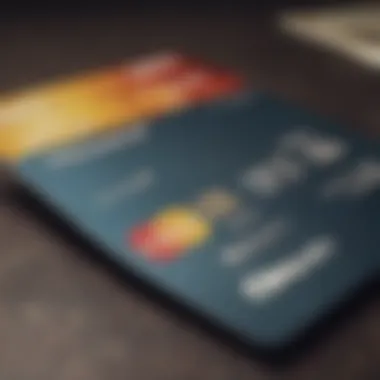Understanding Credit Card Preapproval: A Complete Guide


Intro
When it comes to managing your finances, understanding the nuances of credit is crucial. One term that often gets thrown around is preapproval for credit cards. It sounds straightforward, right? But many individuals are left scratching their heads, unsure of what it truly means and how it fits into the larger picture of personal finance. This confusion can lead to missed opportunities, particularly for young professionals and small business owners who are navigating the financial waters for the first time.
In simpler terms, a preapproval is like that golden ticket, hinting that a lender is willing to offer you credit based on your financial profile. However, it’s important to remember that just because you receive a preapproval doesn’t mean you have a guarantee. It’s essential to dissect the details behind the notion. This article promises to offer a comprehensive overview, guiding you through the preapproval process, its significance, and why it matters in your financial planning journey.
Preface to Credit Card Preapproval
Understanding credit card preapproval is like holding a map before diving into a new city. It provides a clear route, ensuring you don’t get lost in the myriad of credit options out there. For young professionals, students, and small business owners alike, grasping this concept can be pivotal in establishing a strong financial foundation.
In this article, we’ll navigate the intricacies of preapproval, shedding light on why it holds monumental significance in financial planning.
Defining Credit Card Preapproval
Credit card preapproval is a preliminary assessment done by lenders to determine whether you are likely to qualify for a particular card, based on your credit profile and financial behavior. Unlike a hard inquiry, where your credit report gets checked rigorously, preapproval generally involves a soft inquiry. This means no immediate dents on your credit score. The process often entails lenders assessing your credit history, income information, and sometimes even other financial behaviors through aggregated data.
What’s important to grasp here is that preapproval is not a guarantee for approval when applying for the card. Rather, it serves as a reliable heads-up, giving potential cardholders an idea of their chances before formally applying. Think of it as a friendly wave from a lender, nudging you in the right direction while also providing insight into which cards may be within your reach.
Importance of Preapproval in Financial Planning
Navigating the complexities of personal finance can feel like walking a tightrope. Here, preapproval acts as a safety net, helping you understand how your credit fits within the grander scheme of your financial life. By seeking preapproval, you arm yourself with valuable knowledge that informs major financial decisions.
In terms of budgeting, knowing which cards you might qualify for allows you to pinpoint spending capabilities without overextending. This fosters a sense of financial wisdom, where you manageable commitments that won’t compromise your fiscal health.
Moreover, preapproval can enhance your credit score by reducing the number of applications you submit recklessly. Less is more when it comes to applications; fewer inquiries can mean a healthier credit profile. Therefore, it encourages a more thoughtful approach to building credit, which pays dividends down the road.
Preapproval educates consumers, minimizing the risks associated with credit applications while fostering a more strategic financial path.
In summary, understanding credit card preapproval lays the groundwork for informed decision-making and prudent financial planning. It arms you with foresight and reduces the element of chance in your personal finance journey, allowing you to step confidently into your financial future.
How the Preapproval Process Works
The preapproval process is a significant chapter in the journey of securing a credit card. Understanding how this process unfolds is crucial for anyone looking to navigate the financial landscape wisely. By becoming familiar with the steps, benefits, and key factors involved, consumers can enhance their credit management strategies and avoid potential pitfalls.
Applying for Preapproval
When you set out to apply for preapproval, it’s essential to know that the process is generally streamlined to save time and stress. You can usually submit your preapproval application online through a bank's website or through a financial institution’s mobile app.
Upon starting the application, you'll fill out personal details, such as your name, address, Social Security number, and income. It might feel basic, but don’t underestimate the impact of accurately entering this information. It builds a profile that lenders use to assess your creditworthiness initially.
Once you submit the form, lenders do a review through a soft inquiry, which doesn't affect your credit score. This is where your credit report is examined minimally, allowing lenders to take a snapshot of your financial behavior before extending an offer. If all goes well, you'll receive preapproval offers based on your profile within a few days.
Factors Considered in Preapproval
Understanding what goes on behind the scenes can make you more aware of how preapproval offers materialize. Lenders look at various factors, and here are the key ones:
- Credit Score: Your credit score is the backbone of your preapproval chances. A higher score generally means a better chance of receiving favorable terms.
- Debt-to-Income Ratio: This ratio compares your total monthly debt obligations to your gross monthly income. Lenders like to see a low ratio, ideally under 36%, indicating you have enough breathing room to manage additional debt.
- Credit History: Lenders will look not just at your current score but also at how you've managed past credit. Payment history and account types contribute significantly.
- Employment Status: Your job stability can also influence lenders. They want to ensure you have a steady income to pay off future debts.
Understanding these factors can prepare you for the preapproval process and can even guide you on areas to improve for better chances in the future.
Differences Between Preapproval and Full Approval


Many folks confuse preapproval with full approval, but they’re not interchangeable. Here’s a breakdown:
- Nature of Offers: Preapproval indicates you’ve been identified as a candidate for a card, but it isn’t a guarantee. Full approval happens when you officially apply, and all your information checks out.
- Credit Checks: Preapproval typically involves a soft pull on your credit, while full approval requires a hard inquiry, which might impact your credit score.
- Information Required: Preapproval applications usually ask for basic info. On the other hand, full applications dive deeper, often requiring documentation like proof of income or identification.
- Outcome: With preapproval, you might receive one or several offers. However, full approval will solidify your ability to obtain a card based on explicit terms.
Preapproval serves as a stepping stone but remember, it’s essential to understand both sides of the coin before jumping into a commitment.
Navigating the preapproval process can seem overwhelming, but when understood clearly, it becomes a valuable tool in your financial toolkit. Keeping a close eye on your credit health and knowing what lenders consider can lead to smarter choices down the line.
Benefits of Credit Card Preapproval
Credit card preapproval provides potential users with a strategic approach to managing their financial lives. While it may seem like just another piece of paperwork, the perks that come with being preapproved can significantly streamline the credit card experience. This section will dive into the distinct benefits associated with preapproval, highlighting how it plays a crucial role in wise financial planning.
Enhanced Credit Awareness
As you embark on the journey of credit card management, understanding your credit health is key. Credit card preapproval situations often involve lenders assessing your creditworthiness based on your financial activities. When you take steps towards preapproval, you can better grasp what your credit score looks like and how your financial behaviors impact it.
- Learning Opportunities: Many lenders provide feedback that can help you improve your financial habits.
- Benchmarking Credit: Preapproval allows individuals to see where they stand compared to average scores, giving them insights into how to improve.
- Instant Clarity: The process sheds light on your current financial situation, avoiding surprises when you apply for a card.
Being aware of your credit standing isn't just about numbers; it's about empowerment.
Improved Chances of Approval
One of the most appealing aspects of preapproval is that it often leads to a greater likelihood of actually securing a credit card. When you approach a lender with preapproval in hand, they already see you as a less risky investment. Here’s why this matters:
- Preliminary Assessment: Lenders conduct soft inquiries that don't ding your credit score, making it a low-risk way of finding suitable options.
- Targeted Options: You'll likely find offers tailored to your situation, increasing the chances you’ll get something that fits your needs.
- Negotiating Power: With preapproval, you might find you have more leeway in negotiating terms, as lenders value potential customers who are already prequalified.
Understanding Spending Potential
Not only does preapproval paint the picture of what credit options you have, but it also reveals how much spending you might be able to handle. Once armed with your preapproved amounts, you gain a clear perspective on your purchasing power. Finances become less of a gamble and more of a calculated endeavor.
- Controlled Spending: Knowing your spending limit can help create a budget you can realistically work with.
- Future Financial Planning: It aids in setting financial goals. If you know preapproval brings certain limits, you can plan significant purchases in line with it.
- Avoiding Overextension: Awareness of spendable amounts can help you steer clear of overusing credit, preventing future financial strain.
"Credit is a tool, not a toy."
Understanding spending capability is more than just numbers; it provides peace of mind in managing day-to-day expenses.
In essence, the benefits of credit card preapproval extend beyond convenience. They build a foundation of financial literacy, bolster your chances for actual approval, and enlighten you about what’s possible within your budget.
Potential Drawbacks of Preapproval
While credit card preapproval offers several advantages, it is equally important to weigh its potential drawbacks. Understanding these downsides allows individuals to make informed decisions about their financial health. These drawbacks can affect your credit score and can create a false sense of security that may lead to poor financial choices.
Impact on Credit Score
To appreciate the full picture, it is vital to realize that any time you apply for credit, it can impact your credit score. Preapproval inquiries can sometimes lead to a hard inquiry on your credit report. A hard inquiry occurs when lenders check your credit report to make lending decisions.
- Short-term effects: Most hard inquiries may account for about five points off a credit score. While this might not seem like much, it can affect your score if you're planning to make a significant purchase, like a house, soon.
- Long-term consequences: If you have several hard inquiries in a short time, this could signal to lenders that you are struggling financially. This perception could make them hesitant to extend further credit, impacting your chances of loan approval in future.
In contrast, a soft inquiry—such as those common in preapproval processes—will not damage your credit score. Thus, understanding the difference is key. Individuals should consider timing their preapproval requests carefully, ensuring unnecessary inquiries do not accumulate, especially if they anticipate needing other credit soon.
False Sense of Security
Credit card preapproval can sometimes provide a misleading sense of confidence. Just because one is preapproved doesn't mean that the actual approval process will be as seamless.


- Reality Check: Many consumers jump on a preapproval offer, assuming that they’ve already secured credit. However, the preapproval process merely indicates potential eligibility based on initial information, which usually is limited.
- Final Hurdles: After receiving a preapproval notice, individuals may still face challenges. Factors like unsatisfactory income, outstanding debts or changes in their credit profile can lead to denial when applying. This situation could be jarring for those who had already planned their purchases, believing credit was a sure thing.
In this case, a bit of caution goes a long way. While preapproval can boost confidence, relying solely on it without understanding its limitations can plunge someone into financial setbacks. The key is to approach preapproval with a balanced view—knowing that it is a step, not the finish line.
"Preapproval is like a yellow traffic light: it’s a cautionary signal rather than a go-ahead."
Understanding these nuances of credit card preapproval ensures one isn't blindsided by its drawbacks. By keeping these potential pitfalls in mind, one can navigate the credit landscape more effectively, safeguarding against unwanted repercussions.
Creditworthiness and Preapproval
Creditworthiness plays a significant role in the realm of credit card preapproval. Understanding how this concept operates is fundamental for anyone looking to navigate their financial journey wisely. In essence, being creditworthy means that a lender sees you as a reliable candidate for credit. This evaluation often hinges on several elements, chief among them being your credit score.
A strong credit score is like gold in the financial world. It’s the number that lenders obsess over because it provides a quick glance at your financial responsibility. Factors that influence your credit score include your payment history, amounts owed, credit history length, types of credit, and new credit opened. Therefore, maintaining a good credit score is essential for not only getting preapproved for credit cards but also for securing favorable interest rates or credit limits.
It is beneficial to understand your credit score ahead of time. You can often request your credit report for free, allowing you to identify any inaccuracies or areas that need improvement. By having this knowledge, you can be proactive in shaping your creditworthiness, which can significantly affect the preapproval offers you receive.
Furthermore, if potential lenders believe your credit score reflects a high level of risk, you may miss out on preapproval offers altogether. In turn, this could hinder reaching your spending potential and utilizing resources that could enhance your finances. Simply put, a solid credit score can open doors, while a poor score can shut them firmly.
Role of Credit Scores
When it comes to credit card preapproval, the role of credit scores is paramount. Lenders typically utilize your score as a bellwether for your financial behavior. Imagine the credit score as a report card, where higher marks mean you’re more likely to pass the tests of responsible borrowing.
Different scoring models exist—most notably, the FICO score and the VantageScore. While these models vary slightly in how they calculate scores, they follow a similar structure. A score above 700 is generally viewed as good, while anything below 600 may raise flags for lenders.
Here are the primary factors that contribute to your credit score and their importance:
- Payment History (35%): This is the biggest slice of the pie. If you've been timely with past payments, you'll score big.
- Amounts Owed (30%): This looks at how close you are to your credit limits. Keeping debts low is favorable.
- Length of Credit History (15%): A longer credit history can work in your favor, showcasing your long-term reliability.
- Types of Credit (10%): A diverse mix, including credit cards, auto loans and mortgages, hints to lenders that you can handle various kinds of debt.
- New Credit (10%): Too many inquiries for new credit can signal trouble, so pace yourself here.
Having a grasp on these factors will help anyone looking to enhance their creditworthiness and improve their chances of getting preapproved for credit cards.
Income and Employment Verification
While your credit score lays the groundwork for how lenders assess you, income and employment verification serve as a complementary measure. Lenders want to ensure not just that you have a good track record with money, but also that you have the means to pay back any borrowing.
When you apply for preapproval, expecting to share details about your income and employment status is standard. This can include pay stubs, tax returns, or bank statements. By confirming your income, lenders can assess whether you can take on new debt without compromising your financial stability.
Two key factors emerge in this regard:
- Stable Employment: Having a steady job can signal to lenders that you’re less likely to default on payments. Gaps in employment can raise concerns and affect approval chances.
- Debt-to-Income Ratio: This ratio compares your monthly debt payments to your gross monthly income. A lower ratio indicates that you’re not stretched too thin financially, making you a more appealing candidate for credit. Banks typically prefer a ratio below 36%.
In essence, understanding how your income and employment factors into preapproval can set the stage for better financial options down the line. It’s like giving a full picture—one part can shine, but without the other, it might not be enough to secure a favorable outcome.
Myths and Misconceptions About Preapproval
Understanding the myths and misconceptions surrounding credit card preapproval is critical for anyone navigating their financial landscape. Misunderstanding what preapproval entails can lead to misguided decisions and potentially hinder one's financial health. From young professionals to small business owners, debunking these myths can clarify what preapproval means and help individuals manage their credit more effectively.
Common Misunderstandings
Many people believe that getting preapproved for a credit card is a guaranteed approval, which is a major pitfall. In reality, preapproval is based on initial checks and does not guarantee final approval.
Another prevalent misunderstanding is that preapproval will impact your credit score significantly. While it's true that inquiries can cause minor dips in your score, the initial preapproval checks are considered soft inquiries, meaning they typically don’t affect your credit standing much at all.


Finally, there's a notion that preapproval offers everyone the same terms or conditions. This is quite misleading. Lenders have different criteria and offers can vary greatly depending on individual financial situations. What might seem like a good deal for one person could be different for another, even if both were preapproved.
Clarifying the Preapproval Fiction
It’s essential to demystify what preapproval actually means. Preapproval indicates that a financial institution has done a preliminary vetting of your creditworthiness based on limited information, such as your credit history and income level.
However, this should not be seen as a seal of approval. Once full application processes start, lenders might request additional documentation such as proof of income or further credit evaluation. This means that being preapproved is just one step in a longer journey.
“Preapproval is like being allowed to consider purchasing a house; it doesn’t mean your application will go through without a hitch.”
Understanding these nuances helps set realistic expectations. Awareness of what preapproval entails discourages individuals from assuming that receiving a preapproval offer is the end of the conversation about creditworthiness.
Strategies for Effective Credit Management
Understanding effective credit management lays the foundation for financial stability and success. For many, credit cards serve as both a necessity and a potential source of stress, making it crucial—especially for young professionals and small business owners—to navigate this landscape deftly. Having strategies at hand allows individuals to use credit responsibly, ensuring they do not fall into the trap of debt. This section will delve into utilizing preapproval wisely and the importance of maintaining healthy credit habits, shedding light on their benefits and implications.
Utilizing Preapproval Wisely
When navigating the credit card market, wisely using preapproval stands as a golden ticket to unlocking better offers. It’s not just about knowing the cards you might get; it’s about tailoring your financial choices to enhance your status. Preapproval indicates that creditors have already acknowledged your upfront eligibility; however, it doesn’t mean you should leap at the first chance.
It's vital to evaluate various options and offer a few alternatives. For example, if you receive preapproval from both Chase Sapphire Preferred and Capital One Venture, examine the specific perks like travel rewards or cashback offers and choose the one that aligns with your lifestyle. This approach allows you to leverage your prequalification effectively and make informed choices on when and how to apply, leading to maximized benefits without the operational missteps.
Maintaining Healthy Credit Habits
Just as you wouldn’t let your garden run wild, you must nurture your credit health with proactive habits.
Regular Monitoring of Credit Reports
Keeping an eye on your credit report is like having a roadmap to your financial future. Regular monitoring allows you to understand where you stand, spotting any discrepancies or errors. Not only are errors often made, but they can severely impact your score if left unaddressed.
One important aspect of this is that credit bureaus typically allow one free report per year from each major bureau. This means you can check your score regularly without taking a hit on your finances—using services like AnnualCreditReport.com can be a beneficial choice. The unique feature of regularly monitoring your credit reports is that it helps you catch signs of identity theft early, ensuring that your hard-earned credit remains untarnished.
Paying Bills on Time
Time management extends beyond just your job; it permeates every aspect of your finances as well. Paying bills on time is not just a nice-to-have; it’s crucial for keeping your credit score healthy. The key characteristic here is its simplicity—by setting up automatic payments or reminders, you can avoid the pitfalls of late payments.
The unique feature of this practice is its direct impact on your credit score; payment history typically accounts for about 35% of your score. This makes it a beneficial technique for anyone looking to build or maintain credit health. When you stay diligent about your dues, you're not only safeguarding against late fees but also steadily improving your credit worthiness.
"Regularly monitoring your credit report and paying your bills on time form the backbone of effective credit management. They empower you to take charge of your financial future, ensuring that your credit history is not only robust but also reflects your dedication to sound financial practices."
Epilogue
Concluding an exploration into credit card preapproval provides significant insights that can greatly impact financial well-being. This section seeks to encapsulate the critical elements discussed in the previous sections, solidifying the reader's understanding of preapproval in the context of their financial journey.
Credit card preapproval is not merely a marketing gimmick; it serves as a window into a prospective borrower’s financial future. It offers more than just a potential line of credit; it brings clarity to an often convoluted process of obtaining additional funds. Understanding this concept empowers young professionals, students, and small business owners to harness their financial choices actively.
Key benefits of comprehending credit card preapproval include:
- Heightened Awareness: Knowing what preapproval involves can demystify the process and eliminate uncertainty.
- Better Financial Planning: With this knowledge, individuals can make informed decisions regarding applications that align with their financial goals.
- Building Credit Health: Engaging in responsible credit card usage post-preapproval can bolster one’s credit score, enhancing future borrowing capabilities.
However, it's also essential to reflect on the careful considerations associated with preapproval. Savvy consumers should remember that while preapproval may seem like a green light, it does not guarantee outright approval later in the process. It's a conditional offer that can be influenced by changing financial circumstances and lender policies.
As the landscape of personal finance continues to change, so does the significance of understanding tools like credit card preapproval. By bridging the gaps in knowledge surrounding credit management, consumers can better position themselves for success in their financial endeavors.
"Preapproval can be a powerful tool when approached with thoughtful consideration and strategic intent."
In closing, this guide serves not only to inform readers about the nuances of credit card preapproval but also inspires them to engage with their financial choices in a well-informed manner. Armed with the knowledge gained from this article, readers can navigate the credit landscape with confidence, ensuring they make choices that support their long-term financial health.



